- Home
- William Shakespeare
The Taming of the Shrew Page 4
The Taming of the Shrew Read online
Page 4
Thou hast a lady far more beautiful
Than any woman in this waning61 age.
FIRST SERVINGMAN And till the tears that she hath shed for thee
Like envious63 floods o'errun her lovely face,
She was the fairest creature in the world,
And yet65 she is inferior to none.
SLY Am I a lord? And have I such a lady?
Or do I dream? Or have I dreamed till now?
I do not sleep: I see, I hear, I speak,
I smell sweet savours and I feel soft things.
Upon my life, I am a lord indeed
And not a tinker nor Christopher Sly.
Well, bring our lady hither to our sight,
And once again, a pot o'th'smallest ale.
SECOND SERVINGMAN Will't please your mightiness to wash your hands?
O, how we joy to see your wit75 restored!
O, that once more you knew but76 what you are!
These fifteen years you have been in a dream,
Or when you waked, so waked as if you slept.
SLY These fifteen years! By my fay79, a goodly nap.
But did I never speak of80 all that time?
FIRST SERVINGMAN O, yes, my lord, but very idle words,
For though you lay here in this goodly chamber,
Yet would you say ye were beaten out of door,
And rail upon84 the hostess of the house,
And say you would present her at the leet85,
Because she brought stone jugs and no sealed quarts86:
Sometimes you would call out for Cicely Hacket.
SLY Ay, the woman's maid of the house88.
THIRD SERVINGMAN Why, sir, you know no house nor no such maid,
Nor no such men as you have reckoned up90,
As Stephen Sly and old John Naps of Greece91
And Peter Turph and Henry Pimpernell
And twenty more such names and men as these
Which never were nor no man ever saw.
SLY Now lord be thanked for my good amends95!
ALL Amen.
Enter [the Page dressed as a] lady, with Attendants
SLY I thank thee. Thou shalt not lose by it.
PAGE How fares my noble lord?
SLY Marry99, I fare well, for here is cheer enough. Where is my wife?
PAGE Here, noble lord. What is thy will with her?
SLY Are you my wife and will not call me husband?
My men should call me 'lord'. I am your goodman102.
PAGE My husband and my lord, my lord and husband,
I am your wife in all obedience.
SLY I know it well.-- What must I call her?
LORD Madam.
SLY Al'ce107 madam, or Joan madam?
LORD 'Madam', and nothing else. So lords call ladies.
SLY Madam wife, they say that I have dreamed
And slept above some fifteen year or more.
PAGE Ay, and the time seems thirty unto me,
Being all this time abandoned112 from your bed.
SLY 'Tis much. Servants, leave me and her alone.
[Exeunt Attendants]
Madam, undress you and come now to bed.
PAGE Thrice-noble lord, let me entreat of you
To pardon me yet for a night or two,
Or, if not so, until the sun be set.
For your physicians have expressly charged,
In peril to incur your former malady119,
That I should yet absent me from your bed:
I hope this reason stands for121 my excuse.
SLY Ay, it stands122 so that I may hardly tarry so long. But I
would be loath to fall into my dreams again. I will therefore
tarry in despite124 of the flesh and the blood.
Enter a Messenger
MESSENGER Your honour's players, hearing your amendment,
Are come to play a pleasant126 comedy,
For so your doctors hold it very meet127,
Seeing too much sadness hath congealed your blood,
And melancholy is the nurse of frenzy:
Therefore they thought it good you hear a play
And frame131 your mind to mirth and merriment,
Which bars132 a thousand harms and lengthens life.
SLY Marry, I will, let them play it. Is not a comonty a
Christmas gambold133 or a tumbling trick134?
PAGE No, my good lord, it is more pleasing stuff135.
SLY What, household stuff?
PAGE It is a kind of history137.
SLY Well, we'll see't. Come, madam wife, sit by my side
and let the world slip139, we shall ne'er be younger.
They sit
Flourish
[Act 1 Scene 1]
running scene 2
Location: Padua
Enter Lucentio and his man Tranio
LUCENTIO Tranio, since for the great desire I had
To see fair Padua2, nursery of arts,
I am arrived for3 fruitful Lombardy,
The pleasant garden of great Italy,
And by my father's love and leave5 am armed
With his good will and thy good company,
My trusty servant, well approved7 in all,
Here let us breathe8 and haply institute
A course of learning and ingenious9 studies.
Pisa, renowned for grave10 citizens,
Gave me my being and my father first11,
A merchant of great traffic12 through the world,
Vincentio come of13 the Bentivolii.
Vincentio's son, brought up in Florence,
It shall become to serve all hopes conceived,
To deck his fortune with his virtuous deeds14:
And therefore, Tranio, for the time I study,
Virtue and that part of philosophy
Will I apply that treats of19 happiness
By virtue specially to be achieved.
Tell me thy mind, for I have Pisa left
And am to Padua come, as he that leaves
A shallow plash23 to plunge him in the deep
And with satiety24 seeks to quench his thirst.
TRANIO Mi perdonato25, gentle master mine.
I am in all affected26 as yourself,
Glad that you thus continue your resolve
To suck the sweets of sweet philosophy.
Only, good master, while we do admire
This virtue and this moral discipline,
Let's be no stoics31 nor no stocks, I pray,
Or so devote to Aristotle32's checks
As33 Ovid be an outcast quite abjured.
Balk34 logic with acquaintance that you have
And practise rhetoric in your common35 talk,
Music and poesy use to quicken36 you;
The mathematics and the metaphysics,
Fall to38 them as you find your stomach serves you.
No profit grows where is no pleasure ta'en39:
In brief, sir, study what you most affect40.
LUCENTIO Gramercies41, Tranio, well dost thou advise.
If, Biondello, thou wert42 come ashore,
We could at once put us in readiness,
And take a lodging fit to entertain
Such friends as time in Padua shall beget45.
But stay a while, what company is this?
TRANIO Master, some show to welcome us to town.
Enter Baptista with his two daughters, Katherina and Bianca, Gremio a pantaloon, Hortensio suitor to Bianca. Lucentio [and] Tranio stand by
BAPTISTA Gentlemen, importune48 me no farther,
For how I firmly am resolved you know:
That is, not to bestow50 my youngest daughter
Before I have a husband for the elder.
If either of you both love Katherina,
Because I know you well and love you well,
Leave shall you have to court her at your pleasure.
GREMIO To cart her55 rather. She's too rough for me.
<
br /> Aside?
There, there, Hortensio, will you56 any wife?
KATE I pray you, sir, is it your will
To Baptista
To make a stale58 of me amongst these mates?
HORTENSIO 'Mates', maid? How mean you that? No mates for you,
Unless you were of gentler, milder mould.
KATE I'faith, sir, you shall never need to fear:
Iwis62 it is not halfway to her heart.
But if it were, doubt not her care63 should be
To comb your noddle64 with a three-legged stool
And paint65 your face and use you like a fool.
HORTENSIO From all such devils, good lord deliver us!
GREMIO And me too, good lord!
TRANIO Husht, master! Here's some good pastime toward68;
Aside to Lucentio
That wench is stark mad or wonderful froward69.
LUCENTIO But in the other's silence do I see
Aside to Tranio
Maid's mild behaviour and sobriety.
Peace, Tranio!
TRANIO Well said, master. Mum73, and gaze your fill.
Aside to Lucentio
BAPTISTA Gentlemen, that I may soon make good
What I have said, Bianca, get you in,
And let it not displease thee, good Bianca,
For I will love thee ne'er the less, my girl.
KATE A pretty peat78! It is best
Put finger in the eye, an she knew why79.
BIANCA Sister, content you80 in my discontent.
Sir, to your pleasure81 humbly I subscribe:
My books and instruments shall be my company,
On them to look and practise by myself.
LUCENTIO Hark, Tranio, thou may'st hear Minerva84 speak.
HORTENSIO Signior Baptista, will you be so strange85?
Sorry am I that our good will effects86
Bianca's grief.
GREMIO Why will you mew her up88,
Signior Baptista, for89 this fiend of hell,
And make her90 bear the penance of her tongue?
BAPTISTA Gentlemen, content ye, I am resolved.--
Go in, Bianca.--
[Exit Bianca]
And for93 I know she taketh most delight
In music, instruments and poetry,
Schoolmasters will I keep within my house
Fit to instruct her youth. If you, Hortensio,
Or Signior Gremio, you, know any such,
Prefer98 them hither, for to cunning men
I will be very kind, and liberal
To mine own children in good bringing up.
And so farewell.-- Katherina, you may stay,
For I have more to commune102 with Bianca.
Exit
KATE Why, and I trust I may go too, may I not? What,
shall I be appointed hours104, as though, belike, I knew not
what to take and what to leave? Ha?
Exit
GREMIO You may go to the devil's dam106. Your gifts are so
good, here's none will hold you107.-- Their love is not so great,
Hortensio, but we may blow our nails108 together, and fast it
fairly out. Our cake's dough on both sides109. Farewell. Yet for
the love I bear my sweet Bianca, if I can by any means light
on110 a fit man to teach her that wherein she delights, I will
wish112 him to her father.
HORTENSIO So will I, Signior Gremio. But a word, I pray.
Though the nature of our quarrel yet never brooked parle114,
know now, upon advice115, it toucheth us both -- that we may
yet again have access to our fair mistress and be happy rivals
in Bianca's love -- to labour and effect117 one thing specially.
GREMIO What's that, I pray?
HORTENSIO Marry, sir, to get a husband for her sister.
GREMIO A husband? A devil.
HORTENSIO I say a husband.
GREMIO I say a devil. Think'st thou, Hortensio, though her
father be very rich, any man is so very a fool to be married to
hell?
HORTENSIO Tush, Gremio, though it pass125 your patience and
mine to endure her loud alarums126, why, man, there be good
fellows in the world, an127 a man could light on them, would
take her with all faults, and money enough.
GREMIO I cannot tell, but I had as lief129 take her dowry with
this condition: to be whipped at the high cross130 every
morning.
HORTENSIO Faith, as you say, there's small choice in rotten
apples. But come, since this bar in law133 makes us friends, it
shall be so far forth friendly maintained till by helping
Baptista's eldest daughter to a husband we set his youngest
free for a husband, and then have to't afresh136. Sweet Bianca!
Happy man be his dole!137 He that runs fastest gets the ring.
How say you, Signior Gremio?
GREMIO I am agreed, and would I had given him the best
horse in Padua to begin his wooing that would thoroughly
woo her, wed her and bed her and rid the house of her!
Come on.
Exeunt both [Gremio and Hortensio].
Tranio and Lucentio remain
TRANIO I pray, sir, tell me, is it possible
That love should of a sudden take such hold?
LUCENTIO O Tranio, till I found it to be true,
I never thought it possible or likely.
But see, while idly I stood looking on,
I found the effect of love in idleness148,
And now in plainness do confess to thee,
That art to me as secret150 and as dear
As Anna to the Queen of Carthage151 was,
Tranio, I burn, I pine, I perish, Tranio,
If I achieve not this young modest girl.
Counsel me, Tranio, for I know thou canst.
Assist me, Tranio, for I know thou wilt.
TRANIO Master, it is no time to chide you now.
Affection is not rated157 from the heart:
If love have touched you, naught remains but so,
Redime te captum quam queas minimo159.
LUCENTIO Gramercies, lad. Go forward160. This contents:
The rest will comfort, for thy counsel's sound.
TRANIO Master, you looked so longly162 on the maid,
Perhaps you marked not163 what's the pith of all.
LUCENTIO O, yes, I saw sweet beauty in her face,
Such as the daughter of Agenor165 had,
That made great Jove to humble him166 to her hand.
When with his knees he kissed167 the Cretan strand.
TRANIO Saw you no more? Marked you not how her sister
Began to scold and raise up such a storm
That mortal ears might hardly endure the din?
LUCENTIO Tranio, I saw her coral lips to move
And with her breath she did perfume the air.
Sacred and sweet was all I saw in her.
TRANIO Nay, then, 'tis time to stir him from his trance.--
Aside
I pray, awake, sir. If you love the maid,
Bend176 thoughts and wits to achieve her. Thus it stands:
Her elder sister is so curst177 and shrewd
That till the father rid his hands of her,
Master, your love must live a maid179 at home,
And therefore has he closely180 mewed her up,
Because she will not be annoyed181 with suitors.
LUCENTIO Ah, Tranio, what a cruel father's he!
But art thou not advised183 he took some care
To get her cunning schoolmasters to instruct her?
TRANIO Ay, marry, am I, sir, and now 'tis plotted.
LUCENTIO I have it, Tranio.
TRANIO Master, for my hand187,
Both our inventions meet188 and
jump in one.
LUCENTIO Tell me thine first.
TRANIO You will be schoolmaster
And undertake the teaching of the maid:
That's your device192.
LUCENTIO It is: may it be done?
TRANIO Not possible, for who shall bear194 your part,
And be in Padua here Vincentio's son,
Keep house196 and ply his book, welcome his friends,
Visit his countrymen and banquet them?
LUCENTIO Basta198, content thee, for I have it full.
We have not yet been seen in any house,
Nor can we be distinguished by our faces
For man or master. Then it follows thus:
Thou shalt be master, Tranio, in my stead,
Keep house and port203 and servants as I should.
I will some other be, some Florentine,
Some Neapolitan, or meaner205 man of Pisa.
'Tis hatched and shall be so. Tranio, at once
Uncase207 thee: take my coloured hat and cloak.
They exchange clothes
When Biondello comes, he waits on thee,
But I will charm209 him first to keep his tongue.
TRANIO So had you need.
In brief, sir, sith211 it your pleasure is,
And I am tied212 to be obedient --
For so your father charged213 me at our parting,
'Be serviceable to my son', quoth he,
Although I think 'twas in another sense --
I am content to be Lucentio,
Because so well I love Lucentio.
LUCENTIO Tranio, be so, because Lucentio loves.
And let me be a slave, t'achieve that maid
Whose sudden sight220 hath thralled my wounded eye.
Enter Biondello
Here comes the rogue. Sirrah, where have you been?
BIONDELLO Where have I been? Nay, how now? Where are you?
Master, has my fellow Tranio stolen your clothes? Or you
stolen his? Or both? Pray, what's the news?
LUCENTIO Sirrah, come hither. 'Tis no time to jest,
And therefore frame226 your manners to the time.
Your fellow Tranio here, to save my life,
Puts my apparel and my count'nance228 on,
And I for my escape have put on his,
For in a quarrel since I came ashore
I killed a man, and fear I was descried231.
Wait you on him, I charge you, as becomes232,
While I make way from hence to save my life.
You understand me?
BIONDELLO I, sir? Ne'er a whit.
LUCENTIO And not a jot of Tranio in your mouth.
Tranio is changed into Lucentio.
BIONDELLO The better for him. Would I were so too!
TRANIO So could I, faith, boy, to have the next wish after,
That Lucentio indeed had Baptista's youngest daughter.
But, sirrah, not for my sake, but your master's, I advise
You use your manners discreetly242 in all kind of companies:
When I am alone, why, then I am Tranio,
But in all places else your master Lucentio.
LUCENTIO Tranio, let's go. One thing more rests245 that thyself
execute: to make246 one among these wooers. If thou ask me
why, sufficeth247 my reasons are both good and weighty.
Exeunt
The Presenters above speak
FIRST SERVINGMAN My lord, you nod. You do not mind248 the play.
SLY Yes, by Saint Anne, do I. A good matter249, surely.
Comes there any more of it?

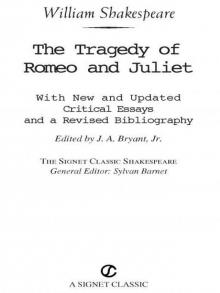 Romeo and Juliet
Romeo and Juliet As You Like It (Folger Shakespeare Library)
As You Like It (Folger Shakespeare Library)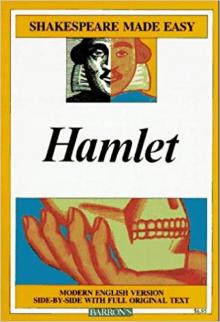 Hamlet
Hamlet Richard II (Folger Shakespeare Library)
Richard II (Folger Shakespeare Library) Macbeth
Macbeth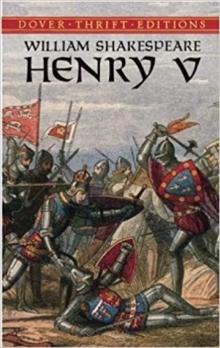 Henry V
Henry V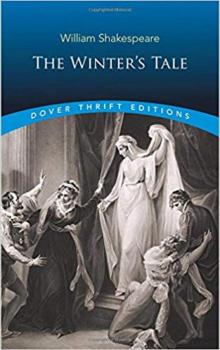 The Winter's Tale
The Winter's Tale The Taming of the Shrew
The Taming of the Shrew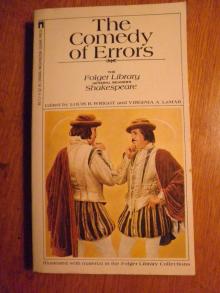 The Comedy of Errors
The Comedy of Errors King Lear (Folger Shakespeare Library)
King Lear (Folger Shakespeare Library)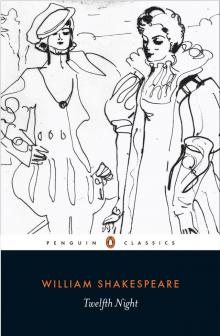 Twelfth Night
Twelfth Night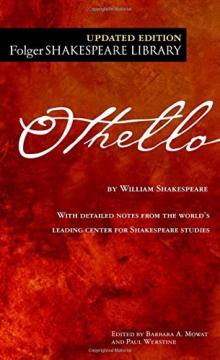 Othello
Othello The Two Gentlemen of Verona
The Two Gentlemen of Verona Henry IV, Part 1 (Folger Shakespeare Library)
Henry IV, Part 1 (Folger Shakespeare Library) King John/Henry VIII (Signet Classics)
King John/Henry VIII (Signet Classics)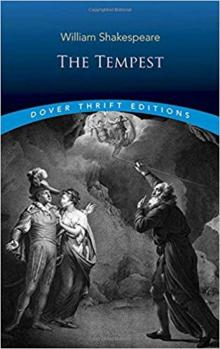 The Tempest
The Tempest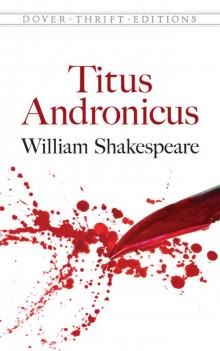 Titus Andronicus (Dover Publications)
Titus Andronicus (Dover Publications)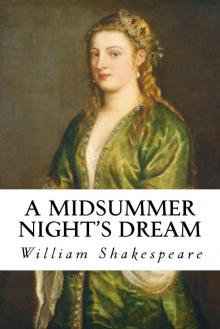 A Midsummer Night's Dream
A Midsummer Night's Dream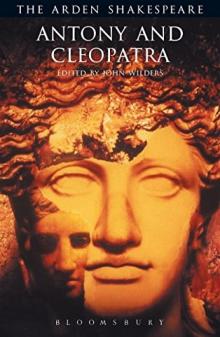 Antony and Cleopatra (Arden Shakespeare: Third Series)
Antony and Cleopatra (Arden Shakespeare: Third Series)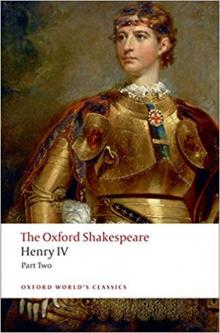 The Oxford Shakespeare: Henry IV, Part 2 (Oxford World's Classics)
The Oxford Shakespeare: Henry IV, Part 2 (Oxford World's Classics)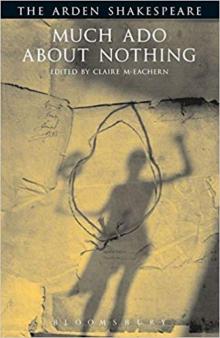 Much Ado About Nothing (Arden Shakespeare: Third Series)
Much Ado About Nothing (Arden Shakespeare: Third Series) All's Well That Ends Well
All's Well That Ends Well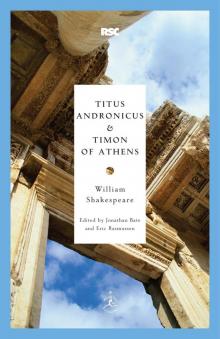 Titus Andronicus & Timon of Athens
Titus Andronicus & Timon of Athens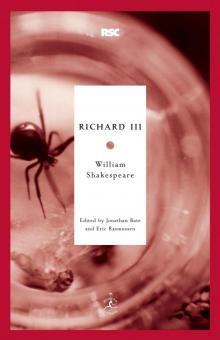 Richard III (Modern Library Classics)
Richard III (Modern Library Classics) Coriolanus
Coriolanus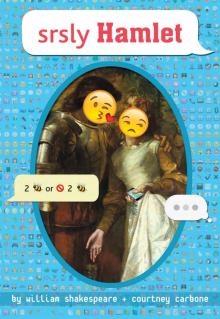 srsly Hamlet (OMG Shakespeare)
srsly Hamlet (OMG Shakespeare)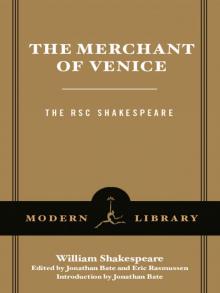 The Merchant of Venice
The Merchant of Venice Richard III
Richard III Richard II
Richard II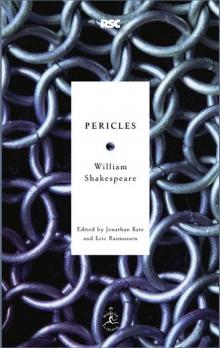 Pericles
Pericles As You Like It
As You Like It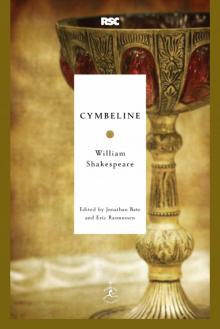 Cymbeline
Cymbeline Alls Wel that ends Well
Alls Wel that ends Well YOLO Juliet
YOLO Juliet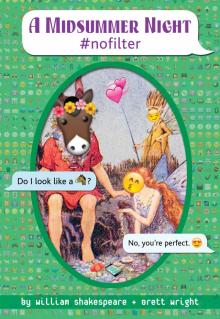 A Midsummer Night #nofilter
A Midsummer Night #nofilter Love's Labour's Lost
Love's Labour's Lost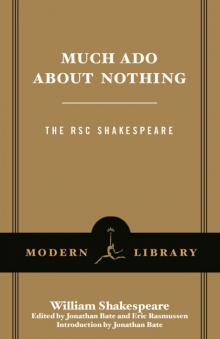 Much Ado About Nothing
Much Ado About Nothing Romeo & Juliet & Vampires
Romeo & Juliet & Vampires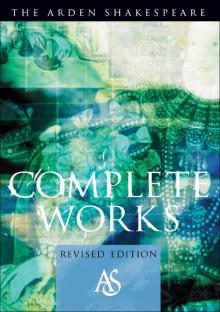 The Arden Shakespeare Complete Works
The Arden Shakespeare Complete Works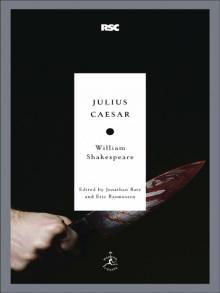 Julius Caesar
Julius Caesar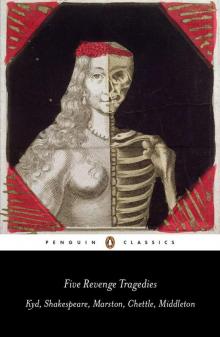 Five Revenge Tragedies: The Spanish Tragedy, Hamlet, Antonio's Revenge, The Tragedy of Hoffman, The Revenger's Tragedy (Penguin Classics)
Five Revenge Tragedies: The Spanish Tragedy, Hamlet, Antonio's Revenge, The Tragedy of Hoffman, The Revenger's Tragedy (Penguin Classics)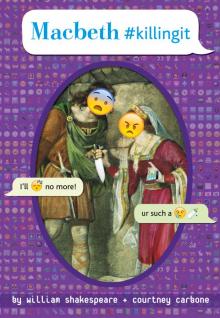 Macbeth #killingit
Macbeth #killingit The Oxford Shakespeare: The Complete Works
The Oxford Shakespeare: The Complete Works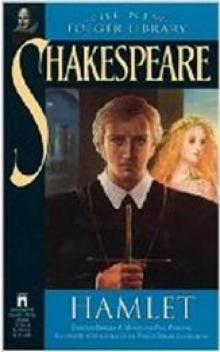 Hamlet, Prince of Denmark (Collins edition)
Hamlet, Prince of Denmark (Collins edition) King John & Henry VIII
King John & Henry VIII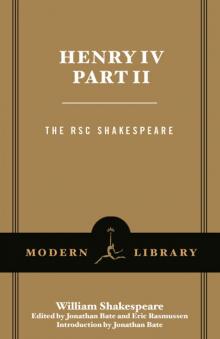 Henry IV, Part 2
Henry IV, Part 2 Complete Plays, The
Complete Plays, The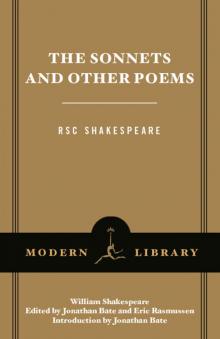 The Sonnets and Other Poems
The Sonnets and Other Poems Antony and Cleopatra
Antony and Cleopatra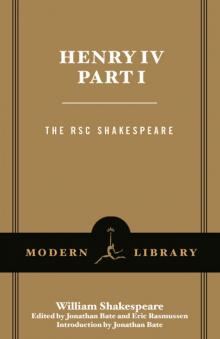 Henry IV, Part 1
Henry IV, Part 1 Is This a Dagger Which I See Before Me?
Is This a Dagger Which I See Before Me? The Complete Works of William Shakespeare In Plain and Simple English (Translated)
The Complete Works of William Shakespeare In Plain and Simple English (Translated) The Sonnets
The Sonnets